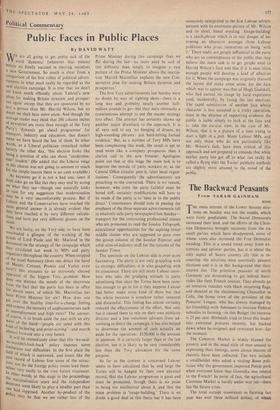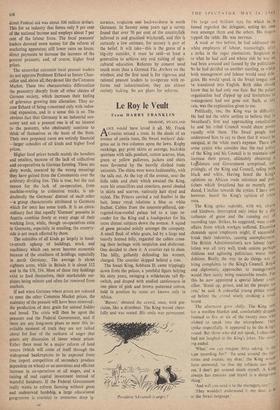The Backward Peasants
From SARAH GAINHAM
BONN
THE main interest of the Lower Saxony elec- tions on Sunday was not the results, which were fairly predictable. The Social Democrats increased their lead, and the efforts of the Chris- tian Democrats brought successes from the six small parties which have disappeared, some of whose votes also increased the Free Democrat standing. This is a sound trend away from ex- tremists and splinter parties, but it is about the only aspect of Saxon country life that is re- assuring; the elections were essentially peasant elections and it is in this background that their interest lies. The primitive peasants of north Germany are threatening to get behind barri- cades like their French cousins. They already go on tentative marches with black mourning flags, and shouted at the electioneering Chancellor in Celle, the home town of the president of the Peasants' League, who has always managed by his friendship with Adenauer to increase Federal subsidies to farming—in this Budget the increase is 25 per cent. Hotheads tried to force this leader into extremist postures recently, but backed down when he resigned, and reinstated him—for the moment.
The Common Market is widely blamed for poverty and in the usual style of men unused to expressing their feelings, some choice blooms of rhetoric have been collected. The best include
a smallholder who asked a visiting Bonn poli- tician why the government imported Polish pork when everyone knew that Gomulka was related to the French! In point of fact, the agricultural Common Market is hardly under way yet—there lies the future crisis. •
The total outside investment in farming last year was over three milliard dollars, of which direct Federal aid was about 500 million dollars. This for an industry that forms only 9 per cent of the national income and employs about 7 per cent of the labour force. The local peasants' leaders demand more money for the reform of marketing apparatus; still lower rates on loans; direct payments to increase the incomes of the poorest peasants; and, of course, higher food prices.
The somewhat extremist local peasant leaders do not approve Professor Erhard as future Chan- cellor and, above all, they do not like the Common Market. These two characteristics differentiate the peasantry sharply from all other classes of German society, which increases their feeling of grievance growing into alienation. They ac- cuse Erhard of being concerned only with indus- trial expansion, and in a sense this is so. The obvious fact that Germany is an industrial eco- nomy and not a peasant one is of no interest to the peasants, who obstinately continue to think of themselves as the basis of the State. Their own proposed cures are entirely financial —larger subsidies of all kinds and higher food prices.
Higher food prices benefit mainly the handlers and retailers, because of the lack of collectives and co-operatives in German farming. These are dirty words, smeared by the wrong meanings they have gained from the Communists over the arbitrary dividing line. This is true, but the real reason for the lack of co-operation, from machine-renting to collection trucks, is un- doubtedly the Germans' distrust of each other —a group characteristic attributed to Germans which for once has some truth. It is an extra- ordinary fact that equally 'German' peasants in Austria combine freely at every stage of their working lives, while, though co-operatives exist in Germany, especially in retailing, the country- side is not much affected by them.
The subsidies of all kinds go largely in hand- to-mouth upkeep of buildings, stock and machinery which can never become economic because of the smallness of holdings, especially in north Germany. The average is about eighteen acres, while in Britain it is about 112 and in the US, 194. Most of these tiny holdings exist to feed themselves, their marketable sur- pluses being minute and often far removed from markets.
If and when German wheat prices are reduced to meet the other Common Market prices, the mainstay of the peasant will have been removed: the production of dear grain for animal fodder and bread. The crisis will then be upon the peasants and the Federal Government, and if there are any long-term plans to meet this in- evitable moment of truth they are not talked about for fear of the outburst of anger that greets any discussion of lower wheat prices. Either there must be a major reform of land tenure (which will come of itself through the widespread bankruptcies to be expected from free import competition of secondary produce dependent on wheat) or an enormous and efficient increase in co-operatives at all stages, and a raising of real capital investment instead of wasteful handouts. If the Federal Government really wants to reform farming without great and undeserved hardship, a large educational programme is essential to overcome deep ig- norance, suspicion and backwardness in north Germany. In Saxony some years ago a survey found that over 70 per cent of the countryfolk believed in and practised witchcraft, and this is certainly a low estimate, for secrecy is part of the belief. It will take—this is the guess of a big-city outsider, it roust be said—at least a generation to achieve any real raising of agri- cultural education. Reforms by consent need much more than a German The Archers on the wireless; and the first need is for vigorous and rational peasant leaders to co-operate with re- forms and indoctrination; they are almost entirely lacking. So are plans for reforms.







































 Previous page
Previous page